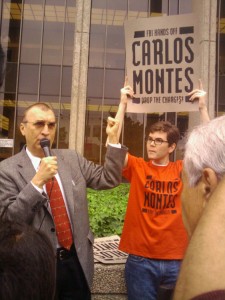#SomosTodosMacacos #WeAreAllMonkeys
|
EL PASO — “There is no racism [on the field], but maybe there is a word or gesture that is not correct. The one affected by this should say this is a game and shake hands.”
That is the answer to racism that Sepp Blatter, the president of FIFA, the international governing body of soccer, proposed when interviewed by CNN back in 2011. Not only did he deny that racism exists, which is not the only time he (or FIFA) has denied racism, he proposed a preposterous solution to battle racism when two high profile cases of racism were going on in England. Barcelona star Daniel Alves, who is Brazilian, along with his teammate and compatriot Neymar Santos have decided to not battle racism with something as simplistic as a handshake. They have taken to social media to spread their message, “Somos todos macacos”, Portuguese for “We are all monkeys.”
It started during a Spanish league game, when Barcelona FC were playing a game in Villarreal and in the 77th minute a fan from Villarreal threw a banana at Alves, who was about to take a corner kick.

